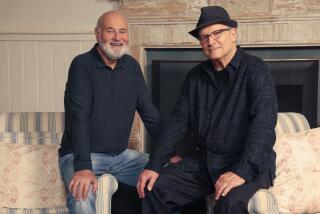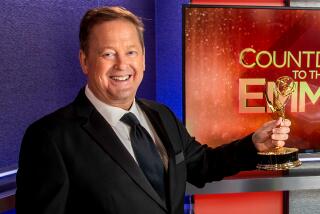Robert Osborne dies at 84; genial student of films hosted Turner Classic Movies
- Share via
Robert Osborne, who displayed an encyclopedic knowledge — and love — of film history as the primary host of Turner Classic Movies, died Monday morning at age 84, said his partner of 20 years, theater director and producer David Staller.
Osborne died of natural causes in his sleep at home in New York City, Staller said.
“It’s difficult to imagine a planet without him,” Staller said. “He made the choice to call it a day, and he wants everyone to know that he’ll see them at the after party.”
The genial, silver-haired and dapper Osborne was a bona fide movie connoisseur who displayed his wide knowledge of films on TCM since the 24-hour commercial-free cable network’s launch in 1994.
“Hi, I’m Robert Osborne,” he’d cordially greet viewers from a stylish living-room set and quickly begin serving up fascinating information and insider trivia about the movie that was about to be shown. At the end of each film, the man Washington Post TV critic Tom Shales dubbed “an avatar of erudition” offered his closing remarks.
Osborne was a longtime columnist for the Hollywood Reporter and the “official biographer” of the Academy Awards, writing a series of books chronicling the Oscars. In a 2013 Los Angeles Times interview with Susan King, Osborne said he thought the Academy of Motion Picture Arts and Sciences selected him to write the official Oscar history because in previous books he stuck to facts, not opinions.
“That goes back to a book I read a long time ago about movie musicals,” Osborne said. “Whoever wrote it said ‘Singin’ in the Rain’ was the best movie musical ever made. I thought it’s great, but what if I like ‘The Band Wagon’ better? I found it insulting. I don’t think a writer’s opinion in this case is important.”
With an extensive library of films spanning the decades, Osborne was clearly in his element on TCM.
“For anyone who loves movies like I do, Turner Classic Movies will be like falling into paradise,” he told the Hollywood Reporter in 1994 when he was named host.
A resident of New York City since the late 1980s, he’d generally fly to Atlanta once a month to shoot a series of opening and closing segments for upcoming films. Viewers looked forward to hearing his comments on each movie.
“You feel like it’s not just a guy up there reading copy that people prepared for him to read,” film critic and historian Richard Schickel told the Washington Post in 2005. “That’s a good quality and increasingly rare in the television climate of our times. He’s something a lot more than just a talking head.”
Osborne had more than his share of movie star fans in Hollywood.
Besides hosting movies seven evenings a week, Osborne hosted special one-on-one “Private Screening” interviews with stars such as Tony Curtis, Esther Williams and Robert Mitchum —as well as directors, including Sidney Lumet, Stanley Donen and Norman Jewison.
He also co-hosted films considered “The Essentials,” and he co-hosted the “Guest Programmer” series with guests such as Mia Farrow, Buck Henry and Hugh Hefner.
Off the air, Osborne served as the main host of the TCM Classic Film Festival in Hollywood and shared his knowledge of film history with fellow passengers on the annual TCM Film Cruise.
Osborne took over veteran Variety columnist Army Archerd’s role as red carpet celebrity greeter at the Oscars ceremony in 2006, the same year Osborne received a star on the Hollywood Walk of Fame.
Among books he authored is “Hollywood Legends: The Life and Films of Humphrey Bogart and Greta Garbo” (1967).
Making a living off writing and talking about movies — not to mention being satirized on “Saturday Night Live” by Darrell Hammond and Jason Sudeikis and having a bobblehead made in his image — was a dream come true for Osborne.
He was born May 3, 1932, in Colfax, Wash., a small farming town, where he found escape at the movies.
“I’d see Clifton Webb and Gene Tierney in ‘Laura’ and Bette Davis in ‘All About Eve,’ and I’d think, ‘Those people are so much more interesting than what I’m living around in this town,’” he recalled in a 2006 interview with the New York Times.
Osborne majored in journalism at the University of Washington and then spent two years in the Air Force. While stationed in Seattle, he began acting in local theater in his spare time. At the suggestion of Oscar-winning actress Jane Darwell, with whom he appeared in a play, he headed to Hollywood after completing his military service in the late ’50s.
In Hollywood, Osborne quickly landed a six-month contract at 20th Century Fox and then joined a new contract-player group at Desilu studios under Lucille Ball’s personal supervision.
Osborne had small parts in TV series such as “The Californians,” “The Whirlybirds” and “Alcoa Presents: One Step Beyond,” as well as playing banker Milburn Drysdale’s young assistant in the pilot episode of “The Beverly Hillbillies” in 1962.
He became close friends with Ball, who was impressed with both his education and his knowledge of movie history. But she ultimately advised him not to stick with acting.
Osborne’s first book, “Academy Awards Illustrated,” was published in 1965.
He joined the Hollywood Reporter in 1977 and took over the Rambling Reporter column from Hank Grant in 1983. He served as president of the Los Angeles Film Critics Assn. from 1981-83.
On television, Osborne began serving as entertainment reporter for KTTV in Los Angeles in 1982 and five years later became a regular contributor on CBS’ “The Morning Program.” He was a host on cable’s the Movie Channel before moving to TCM.
With his life then rooted in classic movies, Osborne told The Times in 2013 he didn’t get to see contemporary films all that much. “I did see ‘Gravity,’” he said at the time, “but I don’t have the enthusiasm to go see a movie as often as I used to go.”
Times staff writer Jen Yamato contributed to this article.
ALSO
Robert Osborne was everyone’s favorite movie date
George Michael died of natural causes, coroner says
Bill Paxton died from a stroke after heart surgery
More to Read
Only good movies
Get the Indie Focus newsletter, Mark Olsen's weekly guide to the world of cinema.
You may occasionally receive promotional content from the Los Angeles Times.







